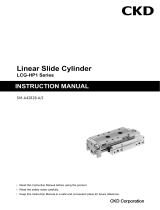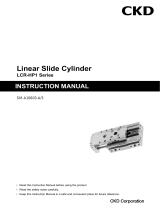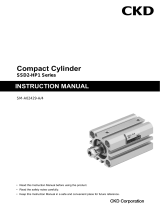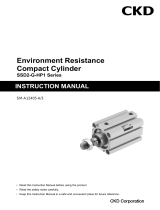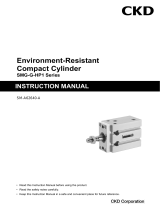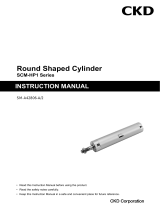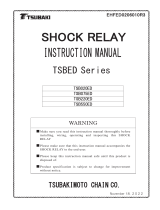Page is loading ...

INSTRUCTION MANUAL
取扱説明書
Guided Cylinder
STM-HP1 Series
SM-A42802-A/2
• Read this Instruction Manual before using the product.
• Read the safety notes carefully.
• Keep this Instruction Manual in a safe and convenient place for future reference.

SM-A42802-A/2 PREFACE
i 2022-06-27
PREFACE
Thank you for purchasing CKD's "STM-HP1 Series "Guided Cylinder.
This Instruction Manual contains basic matters such as installation and usage instructions in order to
ensure optimal performance of the product. Please read this Instruction Manual thoroughly and use the
product properly.
Keep this Instruction Manual in a safe place and be careful not to lose it.
Product specifications and appearances presented in this Instruction Manual are subject to change
without notice.
• The product is intended for users who have basic knowledge about materials, piping, electricity,
and mechanisms of pneumatic components. CKD shall not be responsible for accidents caused
by persons who selected or used the product without knowledge or sufficient training.
• Since there are a wide variety of customer applications, it is impossible for CKD to be aware of all
of them. Depending on the application or usage, the product may not be able to exercise its full
performance or an accident may occur due to fluid, piping, or other conditions. It is the
responsibility of the customer to check the product specifications and decide how the product shall
be used in accordance with the application and usage.

SM-A42802-A/2 SAFETY INFORMATION
ii 2022-06-27
SAFETY INFORMATION
When designing and manufacturing any device incorporating the product, the manufacturer has an
obligation to ensure that the device is safe. To that end, make sure that the safety of the machine
mechanism of the device, the fluid control circuit, and the electric system that controls such mechanism
is ensured.
To ensure the safety of device design and control, observe organization standards, relevant laws and
regulations, which include the following:
ISO 4414, JIS B 8370, JFPS 2008 (the latest edition of each standard), the High Pressure Gas
Safety Act, the Industrial Safety and Health Act, other safety rules, organization standards, relevant
laws and regulations
In order to use our products safely, it is important to select, use, handle, and maintain the products
properly.
Observe the warnings and precautions described in this Instruction Manual to ensure device safety.
Although various safety measures have been adopted in the product, customer's improper handling
may lead to an accident. To avoid this:
Thoroughly read and understand this Instruction Manual
before using the product.
To explicitly indicate the severity and likelihood of a potential harm or damage, precautions are
classified into three categories: "DANGER", "WARNING", and "CAUTION".
DANGER
Indicates an imminent hazard. Improper handling will cause death or
serious injury to people.
WARNING
Indicates a potential hazard. Improper handling may cause death or serious
injury to people.
CAUTION
Indicates a potential hazard. Improper handling may cause injury to people
or damage to property.
Precautions classified as "CAUTION" may still lead to serious results depending on the situation.
All precautions are equally important and must be observed.
Other general precautions and tips on using the product are indicated by the following icon.
Indicates general precautions and tips on using the product.

SM-A42802-A/2 SAFETY INFORMATION
iii 2022-06-27
Precautions on Product Use
WARNING
The product must be handled by a qualified person who has extensive knowledge and
experience.
The product is designed and manufactured as a device or part for general industrial machinery.
Use the product within the specifications.
The product must not be used beyond its specifications. Also, the product must not be modified
and additional work on the product must not be performed.
The product is intended for use in devices or parts for general industrial machinery. It is not
intended for use outdoors or in the conditions or environment listed below.
• In applications for nuclear power, railroad system, aviation, ship, vehicle, medical equipment,
and equipment that directly touches beverage or food.
• For special applications that require safety including amusement equipment, emergency shut-
off circuit, press machine, brake circuit, and safety measures.
• For applications where life or properties may be adversely affected and special safety
measures are required.
(Exception is made if the customer consults with CKD prior to use and understands the
specifications of the product. However, even in that case, safety measures must be taken to
avoid danger in case of a possible failure.)
Do not handle the product or remove pipes and devices until confirming safety.
• Inspect and service the machine and devices after confirming the safety of the entire system.
Also, turn off the energy source (air supply or water supply) and power to the relevant facility.
Release compressed air from the system and use extreme care to avoid water or electric
leakage.
• Since there may be hot or live parts even after operation has stopped, use extreme care when
handling the product or removing pipes and devices.
• When starting or restarting a machine or device that incorporates pneumatic components,
make sure that a safety measure (such as a pop-out prevention mechanism) is in place and
system safety is secured.
Precautions on Product Disposal
CAUTION
When disposing of the product, comply with laws pertaining to disposal and cleaning of
wastes and have an industrial waste disposal company dispose of the product.

SM-A42802-A/2 CONTENTS
iv 2022-06-27
CONTENTS
PREFACE ........................................................................................................................... i
SAFETY INFORMATION .................................................................................................. ii
Precautions on Product Use .......................................................................................... iii
Precautions on Product Disposal .................................................................................. iii
CONTENTS ...................................................................................................................... iv
1. PRODUCT OVERVIEW ............................................................................................. 1
1.1 Model Number Indication .................................................................................... 1
1.1.1 Product model number ................................................................................... 1
1.2 Specifications ...................................................................................................... 4
1.2.1 Product specifications .................................................................................... 4
1.2.2 Switch specifications ...................................................................................... 5
2. INSTALLATION ......................................................................................................... 6
2.1 Environment ........................................................................................................ 6
2.2 Unpacking ........................................................................................................... 7
2.3 Mounting ............................................................................................................. 7
2.3.1 Mounting the Body ......................................................................................... 7
2.3.2 Mounting the switch ........................................................................................ 9
2.3.3 Changing the position of the switch ..............................................................11
2.3.4 Replacing the switch .....................................................................................11
2.4 Piping ................................................................................................................ 12
2.4.1 Piping joint .................................................................................................... 14
2.5 Wiring ................................................................................................................ 15
2.5.1 Proximity switch ............................................................................................ 15
3. USAGE ..................................................................................................................... 18
3.1 Using the Cylinder............................................................................................. 18
3.2 Using the Switch ............................................................................................... 19
4. MAINTENANCE AND INSPECTION ....................................................................... 21
4.1 Periodic Inspection............................................................................................ 22
4.1.1 Inspection item ............................................................................................. 22
4.1.2 Maintenance of the product .......................................................................... 22
4.1.3 Maintenance of the circuit ............................................................................ 22
4.1.4 Internal structural diagram............................................................................ 23
5. TROUBLESHOOTING............................................................................................. 24
5.1 Problems, Causes, and Solutions .................................................................... 24
5.1.1 Cylinder ........................................................................................................ 24
5.1.2 Switch ........................................................................................................... 25
6. WARRANTY PROVISIONS ..................................................................................... 26
6.1 Warranty Conditions ......................................................................................... 26
6.2 Warranty Period ................................................................................................ 26

SM-A42802-A/2 1. PRODUCT OVERVIEW
1 2022-06-27
1. PRODUCT OVERVIEW
1.1 Model Number Indication
1.1.1 Product model number
◼ Example of model number indication:STM-HP1 series
Note1: When using a 2-color display proximity switch for
STM-B-6, avoid mounting the cylinder on a
magnetic substance such as a metal plate. This
could lead to switch detection malfunction.

SM-A42802-A/2 1. PRODUCT OVERVIEW
2 2022-06-27
◼ Example of model number indication:STM-P4※-HP1 series
Note1: When using a 2-color display proximity switch for
STM-B-6, avoid mounting the cylinder on a
magnetic substance such as a metal plate. This
could lead to switch detection malfunction.

SM-A42802-A/2 1. PRODUCT OVERVIEW
3 2022-06-27
◼ Stroke length
Bore size
Standard stroke
length (mm)
Max. stroke length
(mm)
Min. stroke length
Min. stroke with
switch
φ6
5・10・15
15
5
5
φ10
5・10・15・20
20
※ Products other than standard stroke length are made to order.

SM-A42802-A/2 1. PRODUCT OVERVIEW
4 2022-06-27
1.2 Specifications
1.2.1 Product specifications
Model
STM-M/B-HP1
STM-M/B-P4※-HP1
Descriptions
Bore size
mm
φ6
φ10
Actuation
Double acting
Working fluid
Compressed air
Max. working pressure
MPa
0.7
Min. working pressure
MPa
0.15
Proof pressure
MPa
1.05
Ambient temperature
°C
-10 to 60 (no freezing)
Port size
M3
Stroke tolerance
mm
Working piston speed
mm/s
50 to 500
Cushion
With rubber cushion
Lubrication
Not required
Allowable absorbed energy
J
0.008
0.054
+1.5
0

SM-A42802-A/2 1. PRODUCT OVERVIEW
5 2022-06-27
1.2.2 Switch specifications
Descriptions
Proximity
2-wire type
3-wire type
F2S/H/V
F2YH/V
F3S/H/V
F3YH/V
Applications
Only for programmable controller
For programmable controller, relay
Power supply voltage
―
10 to 28VDC
Load voltage
10 to 30VDC
24VDC±10%
30 VDC or less
Load current
5 to 20mA Note 2
50 mA or less
Current consumption
―
10 mA or less at 24 VDC
Internal voltage drop
4V or less
0.5V or less
Indicator
Yellow LEDNote 3
(Lights up when turned
on)
Red/green LED
(Lights up when turned
on)
Yellow LED Note 3
(Lights up when turned
on)
Red/green LED
(Lights up when turned
on)
Leakage current
1 mA or less
10 μA or less
Lead wire Note 1
Standard is 1 m
(Elasticity,Oil-resistant vinyl cabtyre 2 core cord,
0.15 mm2)
Standard is 1 m
(Elasticity,Oil-resistant vinyl cabtyre 3 core cord,
0.15 mm2)
Shock resistance
980m/s2
Insulation resistance
20 MΩ or more with 500 VDC megger
Withstand voltage
No abnormality after applying 1000 VAC for one minute
Ambient temperature
−10°C to 60°C
Degree of protection
IP 67 (IEC standard), JIS C 0920 (watertight), oil-resistant
Descriptions
Proximity 3-wire type
F3PH/V
Applications
For programmable controller, relay
Power supply voltage
4.5 to 28VDC
Load voltage
30 VDC or less
Load current
50mA or less
Current consumption
10 mA or less at 24 VDC
Internal voltage drop
0.5 V or less at 30 mA
Indicator
Yellow LED (Lights up when turned on)
Leakage current
10μA or less
Lead wire Note 1
Standard is 1 m (Elasticity,Oil-resistant vinyl cabtyre 3 core cord, 0.15 mm2)
Shock resistance
980m/s2
Insulation resistance
20 MΩ or more with 500 VDC megger
Withstand voltage
No abnormality after applying 1000 VAC for one minute
Ambient temperature
−10°C to 60°C
Degree of protection
IP 67 (IEC standard), JIS C 0920 (watertight), oil-resistant
Note 1: 3 m and 5 m lead wires are available as options. (Except 5m of F type switch)
Note 2: The maximum load current of 20 mA is the value when the ambient temperature is 25°C.
The current will be lower than 20 mA when the ambient temperature of the switch is higher than 25°C (5 mA to 10 mA at 60°C).
Note 3: The indicator is red LED for F2S and F3S.
Note 4: Switches for P4 * series have different order model numbers from the standard ones.
Please refer to "Equipment related to rechargeable batteries P4* Series"(No.CC-1226A).
※ "F□H" show Lead wire straight type, as well as "F□V" show Lead wire angled type.

SM-A42802-A/2 2. INSTALLATION
6 2022-06-27
2. INSTALLATION
2.1 Environment
CAUTION
When using the product in a cutting, casting, or welding plant, install a cover to prevent
foreign matters such as cutting fluid, chips, powder, and dust from entering.
Do not use the equipment in the following environments.
• Where cutting oil can splash onto the product (abrasives and polishing powder in the oil can
abrade the sliding section)
• Where organic solvents, chemicals, acids, alkalis, and kerosene are present
• Where water can splash onto the product
• Use the product within the following ambient temperature range.
−10°C to 60°C (no freezing)
• For compressed air, use clean and dry air that has been passed through an air filter.
Use an air filter in the circuit and be careful with the filtration rate (a filter that removes particles
exceeding 5 μm is desirable), flow rate, and mounting position (install the filter near the directional
control valve).
• Since the STM-M uses oil-impregnated bearings, oil may be discharged to the outside of the cylinder.
Be careful when using it in a place where you do not want to drain oil.
Air filter
Clean
compressed air
Compressed air

SM-A42802-A/2 2. INSTALLATION
7 2022-06-27
2.2 Unpacking
• Check that the model number ordered and the model number indicated on the product are the same.
• Check the exterior of the product for any damage.
• When storing the product, take proper measures to prevent foreign matters from entering the
cylinder.
2.3 Mounting
2.3.1 Mounting the Body
CAUTION
Do not damage surface flatness by denting or scratching the tube main body mounting
surface or the end plate surface.
Make sure that the flatness of the mating surface where the end plate will be attached is 0.02
mm or below.
When mounting the body with bolts, tighten with tightening torque as shown in the table below.
●Through bolt ●Head side mount ●Side mounting
Bore size
(mm)
Thread size
Tightening torque (N·m)
Through bolt
Bottom mount
Head side mount
φ6
M3
1.1
0.6
φ10
M4
2.7
1.6

SM-A42802-A/2 2. INSTALLATION
8 2022-06-27
When attaching a jig, etc., to the end plate, make sure that the bolt insertion length is equivalent to the
Y dimension.
Not doing so could cause malfunction or damage of the end plate.
When mounting the workpiece on the end plate, tighten with tightening torque as shown in the table below.
Bore size (mm)
Thread size
Tightening
torque (N·m)
φ6
M3
0.6
φ10
M4
1.6
Bore size (mm)
Y dimension
φ6
5
φ10

SM-A42802-A/2 2. INSTALLATION
9 2022-06-27
2.3.2 Mounting the switch
◼ Mounting position
< Mounting the switch at the stroke end >
Mount switches within the rod side dimension RD as well as the head side dimension HD for the
purpose of having switches function at the points of the maximum sensitive position.
< Mounting the switch at the intermediate position of the stroke >
For the switch to function at an intermediate position of the stroke, secure the piston at the position
where the switch needs to function and then slide the switch on the piston back and forth to find the
positions where the switch turns on when slid forward and when slid backward. The intermediate point
between these two positions is where the switch functions at maximum sensitivity for that piston
position and where the switch is to be mounted.
◼ Operating range
This is the range from where the switch is turned on when the piston moves and to where the switch is
turned off when the piston moves farther in the same direction.
◼ Hysteresis
This is the distance from where the switch is turned on when the piston moves and to where the switch
is turned off when the piston moves in the opposite direction.
Hysteresis
Hysteresis
ON
OFF
Operating range

SM-A42802-A/2 2. INSTALLATION
10 2022-06-27
◼ The maximum sensitivity position (HD,RD),Operating range, Hysteresis (unit:mm)
Lead wire direction
H
V
S
Mounting
A
Mounting
B
Note1
F2H/V,F3H/V
F2YH/V,F3YH/V,F3PH/V
F2S,F3S
RD
HD(H)
HD(V)
RD
HD(H)
HD(V)
RD
HD
Mounting
A
φ6
8
5.5(7.5)
5.5(7.5)
8
5.5(7.5)
5.5(7.5)
7
4.5
φ10
10
7.5
7.5
10
7.5
7.5
9
6.5
Mounting
B
φ6
8
-4.5(-6.5)
1.5(3.5)
8
-9(-11)
-6(-8)
7
8
φ10
10
-3.5
0.5
10
8
-4
9
10
Note1: When the switch is mounted as shown in mounting B type, it may project from the body.
If the switch projects from the body, it will interfere with the equipment if the product is installed on the equipment by head side mounting.
Note2:Dimension in ( ) is the dimension for rear piping.
Note3:For mounting dimensions in the table, the negative dimensions are the protruding dimensions toward the head side.
Note4:Switches for P4 * series have different order model numbers from the standard ones.
Please refer to "Equipment related to rechargeable batteries P4* Series"(No.CC-1226A).
(unit:mm)
The
maximum
sensitivity
position
Bore size
(mm)
Proximity switch
1-color display
2-color display
Operating range
Hysteresis
Operating range
Hysteresis
φ6
2.5 to 4.5
1.5 or less
2.5 to 5.5
1.5 or less
φ10

SM-A42802-A/2 2. INSTALLATION
11 2022-06-27
2.3.3 Changing the position of the switch
1 Loosen the fastening screw (set screw).
2 Move the switch body along the groove on the side of the body and then tighten the screw at the
predetermined position.
2.3.4 Replacing the switch
1 Loosen the fastening screw (set screw) and remove the switch body from the groove.
2 Put the replacement switch into the groove.
3 Determine where to position the switch and tighten the screw.
(Tightening torque is 0.03 to 0.08N・m for F2,F3,F3P,F2Y,F3Y.)

SM-A42802-A/2 2. INSTALLATION
12 2022-06-27
2.4 Piping
WARNING
Insert the tube into the fitting until it firmly rests on the tube end and make sure that the tube
does not come off before use.
• Use pipes that are made of corrosion-resistant materials after the filter such as zinc-plated
pipes, nylon tubes, and rubber tubes.
• Use pipes with an effective cross-sectional area that allows the cylinder to achieve the
predetermined piston speed.
• Install the filter for removing rust, foreign matters, and drainage from the piping as close as
possible to the solenoid valve.
• Observe the effective thread length for the gas pipes.
• In addition, chamfer the threaded end of the pipes by about a 1/2 pitch.
◼ Pipe cleaning
Before piping, blow air into the pipes to clean the interior and to remove cutting chips and foreign matters.
Chamfer
Effective length

SM-A42802-A/2 2. INSTALLATION
13 2022-06-27
◼ Seal material
Use a seal tape or a seal material to stop leakage from piping.
Apply a seal tape or seal material to the screw threads leaving two or more threads at the pipe end
uncovered or uncoated. If the pipe end is fully covered or coated, a shred of seal tape or residue of seal
material may enter inside of the pipes or device and cause a failure.
When using a seal tape, wind it around the screw threads in the direction opposite from the screw
threads and press it down with your fingers to attach it firmly.
When using a liquid seal material, be careful not to apply it to resin parts. The resin parts can become
damaged and this may lead to a failure or malfunction.
Also, do not apply seal material to the internal threads.
Seal tape
Seal material (solid or liquid)
Correct
Correct
Incorrect
Incorrect
Leave
two threads

SM-A42802-A/2 2. INSTALLATION
14 2022-06-27
2.4.1 Piping joint
Be sure to attach a speed controller during piping before use.
In addition, when mounting the rear piping with through bolt, the applicable fittings are as follows.
Bore size
Port size
Applicable fitting/
speed controller
Fitting O.D.
D
φ6,10
M3
SC3W-M3-※
SC3U-M3-※
φ8
FTS4-M3
FTL4-M3
GWS※-M3-S
PTN2-M3
PTNL-M3

SM-A42802-A/2 2. INSTALLATION
15 2022-06-27
2.5 Wiring
2.5.1 Proximity switch
◼ Connection of lead wires
Turn off the power to the device in the electric circuit to which the switch is to be connected and connect
the lead wires according to their color. Not turning off the power may cause damage to the electric
circuit of the switch load.
If the switch is not wired correctly or the load is short-circuited, it may cause damage not only to the
switch but also to the electric circuit on the load side.
Switch
Load
Brown
Black
Blue
DC power for
switch and load
10 VDC to 28 VDC
Example of 3-wire basic circuit (1)
(When same power is used for switch and load)
Switch
Load
Example of 3-wire basic circuit (2)
(When separate power is used for switch and load)
DC power for switch
10 VDC to 28 VDC
DC power for load
30 VDC or less
Brown
Black
Blue
Switch
Load
Brown
Blue
10 VDC to 30 VDC
Example of 2-wire basic circuit
~
/

